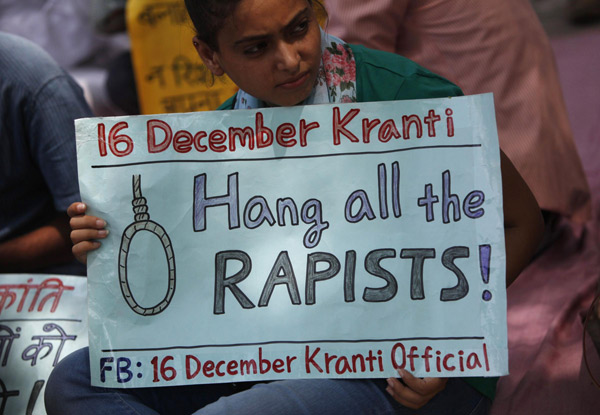India fury over gang rapes sign of change
Updated: 2013-09-03 13:56
(Agencies)
|
|||||||||||
NEW DELHI - A series of recent high-profile gang rape cases in India has ignited a debate: Are such crimes on the rise, or is it simply that more attention is being paid to a problem long hidden within families and villages? The answer, experts say, is both.
Modernization is fueling a crisis of sexual assault in India, with increasingly independent women now working in factories and offices and stepping beyond the subservient roles to which they had traditionally been relegated. They are also more likely than their mothers and grandmothers were to report rapes, and more likely to encounter male strangers in public.
"We never used to see so many cases of gang rape, and so many involving groups of young, unemployed men," said Supreme Court lawyer Kirti Singh, who specializes in women's issues.
While there are no reliable statistics on gang rapes, experts say the trend, along with the growing sense of insecurity it has brought for women, led to recent outbursts of public anger over the long-ignored epidemic of violence against women.
The silence broke in December, when a New Delhi student was gang-raped on a bus in a particularly vicious attack from which she died two weeks later. A juvenile court on Saturday handed down the first conviction in the case, sending a teenager to a reform home for three years for rape and murder.
The sentence, the maximum a juvenile can face, was widely denounced as too lenient, and the girl's parents vowed to appeal. The other suspects in the case are being tried as adults and could face execution if convicted.
While attacks on women occur constantly across India, often within the home, the brutality and public nature of the New Delhi case left many shocked and shamed. Thousands took to the streets in the capital to express their outrage.
The government, pledging to crack down, created fast-track courts for rape cases, doubled prison terms for rape and criminalized voyeurism, stalking, acid attacks and the trafficking of women.
Related Stories
India nabs third suspect in Mumbai gang rape 2013-08-25 08:04
22-year-old photojournalist gang raped in Mumbai 2013-08-23 21:24
Domestic violence by men 'shocking': survey 2013-05-10 10:28
Today's Top News
Japan to fund leak control measures at nuke plant
Senior official removed from office in graft probe
Police reveals more about GSK China's violations
Cooperation with Eurasia against terrorism urged
Assad slams Western accusation
Premier Li sees opportunities despite dispute
Xi's visit to Turkmenistan lauded
Trending news across China
Hot Topics
Lunar probe , China growth forecasts, Emission rules get tougher, China seen through 'colored lens', International board,
Editor's Picks

|

|

|

|

|

|






